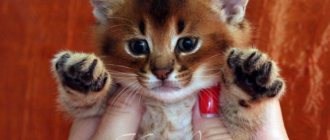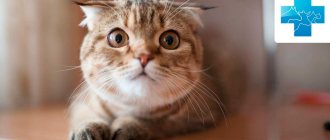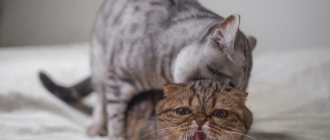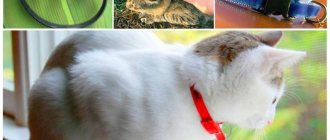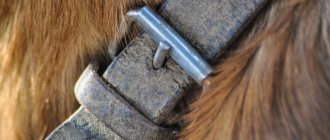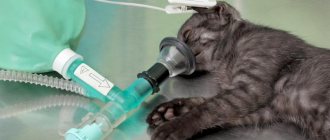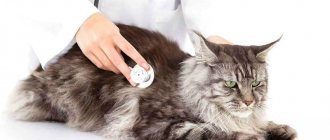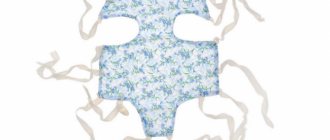Cats differ from people primarily in language and behavior. Of course, you cannot learn to speak the same language with a pet, but everyone can master the basic cat habits. This will allow you not only to better understand your four-legged pets, but also to be able to determine when they have health problems. How to decipher the basic habits of cats? What behavioral features of these animals should be a reason for a visit to the veterinarian?
The cat rubs against people and objects
Representatives of the cat family are also owners. It is important for these animals to have their own territory, which they protect from the encroachments of enemies by all available means. Cat owners also consider their owners their property. Cats rub against them or furnishings to secure ownership of them.
Friction is not a meaningless ritual. With its help, pets leave a special smell on friction objects, which, fortunately, the inhabitants of the home do not feel. Where does it come from? There are special scent glands on the cat's body (face, paws, around the eyes). When an animal rubs against something, they become active - and that something begins to smell. Feeling this smell, the cat calms down and feels confident in its abilities and that the enemy will not encroach on its territory.
The pet rubs against the legs, arms and even sometimes the face of the owner not only to mark him. Friction is one of the ways to show your loved one your tender feelings.
Cat behavior after sterilization and castration
Sterilization and castration are two different operations. Accordingly, after each of them cats behave differently.
A little about the terms
Sterilization is an operation to ligate the fallopian tubes in cats and the seminal ducts in cats (vasectomy). After it, the animal’s genitals remain in place and continue to produce hormones. Under their influence, the pet will still experience hormonal storms. Therefore, he may often experience stress, which is why he shows aggression. In addition, when sterilized, the animal often loses weight because it refuses to eat. It has the ability to mate, but not produce offspring.
Sterilization involves ligation of the fallopian tubes in cats and the seminal ducts in cats
Castration involves complete removal of the genitals. In a cat, these are the ovaries, which are often removed along with the uterus; in a cat, both testicles. Features of behavior - the animal stops marking its territory and screaming.
Cat behavior in the first days after surgery
The first day after sterilization or castration, most cats recover from anesthesia and therefore sleep. Typically, an animal's sleep lasts about 5–6 hours. When it wakes up, it makes several unsuccessful attempts to rise. If your cat manages to get up, be prepared for the fact that at first she will have poor orientation in space, falling and bumping into objects.
On the first day after sterilization, the cat is lethargic
The animal may try to hide, meow and call for help. In the first day or two after sterilization, you need to limit the cat’s interaction with children or other animals, as some pets behave aggressively after anesthesia. If this condition lasts more than 3 days, consult a veterinarian.
When you return home with your animal, wrap it in a warm blanket, since the cat’s body temperature usually drops after anesthesia. Do not place your pet in a place where he can fall (for example, on a chair) - it is better to place him on the floor, on a lounger. Don’t expect that after sterilization the animal will immediately want to eat - try to at least offer it water. By the evening of the second day, the cat should already show interest in food and become active.
Your pet may become aggressive when you touch its belly, and this is normal . However, you will still have to inspect the seams. Typically, 7–10 days after surgery, the animal completely returns to normal life.
Some owners note that after sterilization, their pets become more affectionate and more often ask to be held.
Our behavior changed after castration, well, we have a cat, and this cat really loved the water and began jumping into the bath so that they could play with him in the water.)))
Alekseevna
https://otvet.mail.ru/question/39099147
What does scratching mean?
In general, scratching in cats is often regarded as aggressive behavior. But this does not always indicate the bad character of the animal. If the kitten is small, then this is quite acceptable. After all, this is how he understands the world. Yet these “cute creatures” are predators by nature.
But sometimes even adult cats strive to bite or scold their owner. In this case, your pet has a very highly developed hunting instinct . He perceives your moving legs and arms as “prey.” To satisfy the desire of the “hunter”, purchase special toys for him.
Sometimes curtains and furniture suffer from scratching. Cats don't do this out of spite. When scratched on the surface, they remove old nail scales. And they also keep the paw muscles toned. Damaged furniture and curtains are not pampering for them, but a necessity. Therefore, you should think about buying a scratching post.
Body temperature in cats
Normal body temperature in cats is 38-39 degrees. The larger the animal, the closer its temperature is to the lower limit of normal. So for a kitten the normal temperature will be 38.5-39 degrees, and for an adult large cat – 38-38.5.
Depending on the disease, the cat’s temperature may decrease or increase, but it is impossible to establish a diagnosis based on this sign alone. Both hyperthermia and hypothermia are dangerous conditions for cats.
Also, at elevated temperatures, the cat's ears, paws, and nose may be hot, but this is not necessary.
To measure temperature, you can use a regular medical thermometer and any neutral lubricant (most often Vaseline or Vaseline oil).
The procedure is as follows:
- The thermometer is shaken (or reset if the device is electronic).
- The tip of the thermometer is lubricated and carefully inserted into the cat's anus about 1.5 cm.
- After measuring the temperature, the thermometer is thoroughly wiped with a cloth soaked in a disinfectant solution.
- The device must be stored in the protective case provided by the manufacturer.
Important! Taking temperature is an unpleasant procedure for most animals. In order for a sick cat to experience minimal discomfort during such manipulations, you need to fix it, talk to it calmly and lightly massage the area of the base of the tail from above, from the back.
Buries food
Burying food is one of the most common habits in cats. Reasons for this behavior:
- Some pets bury food because they like it. This usually happens after changing the usual ready-made food for a new one or after the four-legged pet was offered a self-prepared dish that he had not tried before. Not knowing whether he will have a chance to taste the tasty treat again, the animal tries to hide it so that he can enjoy it again later.
More familiar smells
Please believe the experience of the author of these lines: the behavior of pets, primarily cats, changes after moving. Sometimes even radical! We understand that in the hustle and bustle, when things are unloaded, it is incredibly difficult to keep track of the cat. And yet, make a note in your memory: the main focus is on your pet(s). If possible, release your cat into the new house or apartment after most of the things have been brought in and arranged. The abundance of familiar smells will certainly alleviate the first stress. And yet, you may not recognize your pet at all. Anything can happen: a previously calm, leisurely cat bristles, rears up, or tries to escape. The sociable animal hides in the farthest corner and does not appear from there for weeks. Something worse also happens: behavioral disorders, increased vocalization, cats refuse to use the litter box and do their business anywhere. Special attention to those who have two or more pets. When moving to a new place, the hierarchy established between them often collapses, wars for leadership flare up with renewed vigor and are often accompanied by fierce fights.
Of course, it is not at all necessary that everything will go according to the pessimistic scenario. Just forewarned means forearmed. The main thing is to minimize the initial stress by surrounding the animal with familiar smells!
Choosing a kitten
The habits of all cats are generally similar. But how can you find out about the character of an animal if it is a small kitten? How to determine who we choose for ourselves?
There is a theory according to which hormones influence their development. They have an effect on both the body and behavior. Therefore, these two factors are connected, which means that the kitten must be selected based on the expression of its face.
When choosing, you also need to pay attention to your parents. Since kittens are constantly with their mother while growing, they have time to learn basic skills.
Scientists have proven that cats - fathers influence habits and preferences even in the embryonic period. Therefore, if possible, take a closer look at your parents.
The breed plays the biggest role in a cat's character. Therefore, first of all, you need to choose a suitable breed. The period of socialization of a kitten takes place in the first four months. All the skills he can acquire will last a lifetime. Therefore, the owner’s task is to teach his pet everything necessary. And in the end, get maximum positive energy and joy from communicating with this independent creature.
More strange behavior
Some “weirdness” is not a deviation from the norm - it is nature. The cat has found itself in unfamiliar territory, where everything is “foreign.” It is necessary to examine every corner and apply your own scent. In a word, “mark” the territory. Do not prevent a cat that is carefully exploring the house from rubbing its back or face against some objects or things. Don’t be surprised when your pet suddenly craves love and affection - it will spin around you, get under your feet, and “butt” its face. In fact, this is how a defensive psychological reaction works: the animal is nervous, huddles close to its owners, as if waiting for confirmation: nothing terrible has happened, everyone is alive and well, safe. Be sure to caress and stroke the cat at such a difficult moment!
Crushes the owner or upholstered furniture with his paws
Cats mash their owners with their paws because:
- they feel completely safe, just like in childhood, when, as kittens, while feeding, they kneaded their mother’s breasts with their front paws to increase the flow of milk to her nipples;
- they experience true pleasure, and the only way to express gratitude and love to the owner is to sit on his lap and look into his eyes, touching his paws;
- they want to protect a loved one from invisible enemies, leaving odorous marks on him with the help of sweat glands located on the paw pads;
- do therapeutic massage.
These animals crush furniture with their paws to:
- prepare her for bed;
- relieve stress (rhythmic, monotonous movements help them quickly calm down);
- realize sexual instinct during the mating season;
- mark the object of trampling.
The cat is “kneading the dough” again
And very active! Meows, jumps on your lap, purrs, sitting on your lap. Moreover, he “kneads the dough”, which has not been observed for a long time. What is this – an expression of joy from moving? No - this is also a defensive reaction. “Kneading dough” is a behavior inherited by the kitten from distant childhood, when he was close to his mother. The cat is now looking for your sympathy and consolation. We see no reason to refuse an animal such a request! Just “spread some straws” - put on a thick tracksuit or something like that. Your knees shouldn't suffer!
How can you understand your cat by gestures?
Love for animals is a better means of understanding behavioral reactions. I do all of them automatically:
- Nervous twitching or sharp wagging of the tail expresses dissatisfaction;
- raised tail (slightly curved) – good mood and trust in others;
- when frightened or confused, the tail is tucked or fluffed, if the animal is ready to attack another cat or dog (in this regard they are more ferocious), it also hisses with its ears tucked back;
- if the tips of the ears are apart, she is perplexed, raised to the top of the head - a decision has been made, directed forward - interest or recognition of signals.
Sometimes cats scare their owners with their behavior. For example, in complete darkness, when the light comes only from a monitor or gadget, the animal peers at one point with sharply dilating pupils. This does not mean that the cat saw a brownie there (although it is possible); most likely, a spider is descending, the cat is “sharpening.”
Animals are no less emotional than people; they suffer from loneliness in a closed apartment and entertain themselves as best they can. Sometimes they stare at one point for a long time, “freeze”, withdrawing into themselves - the consequences of the stress they have suffered.
Some mark their territory endlessly, others don’t; perhaps they don’t like the smell of a smoky apartment. There are many signs and interpretations of their behavior, so you should not punish the animal. Just try to understand it - look at the world through the eyes of cats.
Condition of coat and skin
A healthy cat has elastic, smooth skin (without foreign formations, swelling and wounds), toned muscles, smooth, shiny, not disheveled fur (the hairs adhere well to each other), without bald patches and dandruff, without ectoparasites and traces of their vital activity.
If the skin of an adult cat or kitten does not meet these requirements, then there is a high probability of developing pathology. Very often, skin changes (local lesions or systemic damage) are a sign of some deeper and more serious disease.
In this case, consultation with a veterinarian is required to make a correct diagnosis and further treatment.
Habit of climbing higher
The habit of climbing on high objects (not every cat has this feature) has 2 justifications:
- Felines do this to realize the territorial feeling inherent in nature. These animals adhere to a hierarchical model of relationships. The owner of the territory climbs to a height - this way he can take in all his possessions with his gaze, which allows him to control the situation and, if necessary, descend, subjugating other relatives or entering into battle with them.
- Cats climb to heights because they feel in danger, which comes, for example, from a dog.
A cat buries its excrement so as not to offend anyone
Many people who have cats in their apartment know that after the pet has gone to the toilet, it intensively buries everything. It looks like the cat is performing these actions instinctively, but there is a reason for these actions.
This behavior was inherited by cats from their ancestors. Even before cats were domesticated, they had many dangerous enemies. And so that their enemies would not find them, the cats buried all their tracks.
Also, cats buried everything they did so as not to offend the dominant male of their group. Therefore, by burying their excrement, cats show their owner that they are afraid of him. As soon as the four-legged pet stops doing this, it will mean that he is no longer afraid of you.
Why do cats hiss when they sense danger?
Many people have repeatedly witnessed “cat fights.” When a cat attacks an enemy, it presses itself to the floor, lowers its ears and emits a terrible hiss. This is explained by the fact that cats are able to imitate and imitate various sounds. Therefore, smart animals chose to imitate a creature that they are practically afraid of - a poisonous snake. The cunning cat's brain understands that hissing is intuitively associated with a snake. That is why, in order to scare the enemy, the cat hisses.
Contents indoors
Keep your pet indoors for the first week or two. Our recommendations mainly apply to those cats that were previously in mixed housing: walked outside, fed and rested at home. In a new place there is an extremely high risk that the cat will try to escape! That’s why we always advise litter training all animals, without exception, even “street” animals. These skills would come in handy now! However, we remember: at first we are only at home. Then you can very carefully accustom your pet to the street. Another skill you may need to learn is walking your cat on a leash.
Love for drawers, boxes and cabinets
What does it mean that cats love boxes, drawers and cabinets and have an irresistible desire to hide in them? This feature is explained by the desire for privacy. This habit was passed on to modern pets from their wild ancestors, who were forced to live in harsh conditions, sometimes hiding in secluded places from the predatory animals that hunted them.
In a residential area, cats are not in danger of becoming victims of an enemy, unless we are talking about them living in the same territory with dogs with whom they do not have a good relationship. However, they retained the habit of hiding in secluded places.
Condition of the eyes and mouth in a sick cat
The conjunctiva (mucous membrane of the eye) and the cat’s mouth should be clean, moderately moisturized, and without defects.
There should also be no visible defects (wounds, ulcers) in the pet’s mouth. The number of teeth is according to age standards. They should be smooth, tightly adjacent to each other, without tartar. There should be no unpleasant odor coming from the cat's mouth.
You should also pay attention to the amount of saliva and the condition of the oral mucosa. It should be smooth and moderately moisturized.
Description of the Scottish Straight cat
Scottish cats differ in a number of characteristic features that are unique to this breed. Sometimes animals are often confused with the British species, but during the comparison process the following differences can be identified:
- more rounded head;
- the body has an oblong and elongated shape, which gives the animal elegance;
- body proportions are slightly reduced;
- the average weight of a cat is 3 - 5 kg, boys weigh slightly more than females;
- pets are very flexible and remain hardy and playful at any age.
The cat brings caught mice, birds and even rats - dead and half-dead
If a cat brings caught rodents and birds to the owner, most likely, in this way she shows maternal feelings when all her forces are aimed at finding food for the cubs. Some animals, with the help of such an original gift, which seems quite appropriate to them, show their owners their tender feelings or gratitude.
Another reason for this behavior is the animal’s desire to teach its owner hunting skills. For this purpose, the pet does not bring killed, but only strangled mice and birds.
What symptoms require immediate medical attention?
All diseases have certain symptom complexes. Therefore, if a cat exhibits one of the signs, there is no need to urgently contact a veterinarian. You can postpone your visit to the clinic for a while and observe your pet. But cats are animals with a fast metabolism, so many diseases, often of infectious etiology (origin), develop quickly in them.
Such cat diseases require immediate medical attention and are characterized by the following signs:
- significant (often persistent) changes in body temperature;
- persistent vomiting and/or diarrhea;
- dehydration;
- intoxication (weakness, lethargy, apathy, lack of appetite);
- neurological abnormalities (disorientation, fainting, paralysis/semi-paralysis);
- blood in urine and/or feces;
- purulent, hemorrhagic discharge from the nose, eyes, genitals;
- eye and head injuries;
- “overgrown” third eyelid;
- extensive wounds or other damage to the skin;
- excessive salivation;
- bloating;
- difficulty breathing, cough;
- itching and/or foul odor in the ears;
- heavy bleeding of various origins.
Expert opinion
Chepa Natalya Semenovna
Veterinarian
Ask an expert
Please note that a drop in temperature to 37.5 or below is dangerous for the animal’s life and requires immediate contact to the clinic. Frequent vomiting and diarrhea are very life-threatening for a cat, especially for small kittens that quickly become dehydrated. Do not hesitate to visit if you have a problem with urination. This applies to a greater extent to males. If a cat sits on the tray frequently, but to no avail, for more than a day, he will need immediate veterinary attention. One of the common problems in cats is constipation. Absence of bowel movements combined with vomiting is a reason to contact the clinic as soon as possible.
Places itself to rest in the most inappropriate places (aisles, on the keyboard, etc.)
Pets sometimes disturb the inhabitants of the home, resting in the passages, occupying the space near interior doors and computer keyboards. Is there any special meaning to this behavior? The tendency of cats to settle in inappropriate places can be explained by the desire to mark boundaries.
Representatives of this family consider the territory on which they live, as well as everything that is on it, to be theirs. By being located in doorways, they demonstrate to the inhabitants of the home, including other animals, that it belongs to them. In addition, by staying in the passages, cats try to cool themselves, since it is in such places that air circulates best in the house. They usually behave this way in the warm season or if the home is too hot.
Perhaps this behavior is also due to the fact that the pet, clearly disturbing the inhabitants of the house, is trying to attract attention to itself in such a simple way. Indeed, it’s hard not to notice the cat, which is sitting imposingly on the keyboard. You shouldn't chase him away. It is better to take your four-legged pet in your arms and spend some time with it.
Live like a cat! 12 rules you should learn from them
Cats have an innate ability to enjoy life, while we need to learn this. Stefan Garnier observed his cat Ziggy for twelve years, and then collected all his observations in the book “Live Like a Cat.” In it, he tried to decipher the cat's habits, habits and characteristics. And he invites you to study their simple secrets in order to escape from everyday worries, regain mental well-being and smile.
The life philosophy of cats is very simple: eat, play, sleep and do what they like. In fact, it is not much different from ours. But only at first glance. Let's learn to appreciate life like they do. Imagine that from today you think and live like a cat.
- Your cat is free. We tend to shackle ourselves hand and foot: with bank loans that force us to work more and more; useless things around which we build a cult; habits that become our responsibilities; people with opposing views.
Do you want to live like your cat? Be free as air and do only what you think is necessary. Why not try to keep only what we love in our lives. Maintain only those relationships that suit us. Do only those things that we like. And do only the work that brings us satisfaction.
- Your cat is charismatic. Cats don't need to meow, rush back and forth, or make a cacophonous noise to get attention. They have such a strong charisma that their presence is immediately felt as soon as they appear in the room. Who doesn't dream of possessing such magnetism? Your cat just is!
Charisma develops when we are honest with ourselves and others and accept ourselves as we are, without hiding our individuality behind tricks.
- Your cat is calm (most of the time). What we call stress in cats is actually increased vigilance and wariness. When potential danger arises, the cat raises its ears, focuses its eyes, watches and waits, but as soon as the danger has passed, it immediately calms down.
Cats don't push themselves like we do. They lead a measured and contemplative life. To maintain peace of mind and well-being, identify the source of stress, solve the problem and forget about it.
- Your cat knows how to stand up for himself. Due to excessive shyness or lack of self-confidence, we cannot always stand up for ourselves. We hesitate, we are afraid to say too much.
Try stepping on your cat's paw and see his reaction. He will let out a heart-rending scream, and perhaps even grab your ankle.
Cats do not claim someone else’s territory, but they also do not tolerate encroachments on their own. Know how to stand up for yourself and stop any attempts to invade your personal space!
- Your cat is wise. With its attentive attitude and ability to listen, the cat resembles a Buddhist teacher or an old sage. But perhaps this is more than just an impression. Maybe we should learn from cats the ability to sit quietly and contemplate what is happening, avoiding vain self-expression.
Sometimes we get too focused on something, forgetting about the main thing: why we came into this world. Perhaps this is exactly what the cat is trying to remind us of with its peace and contemplation.
- Your cat accepts and loves himself for who he is. Does a cat dream of being some other cat or even another animal? Hardly! Cats are proud to be themselves, and this shows in their arrogant attitude towards other animals and even towards people.
- Your cat doesn't care about public opinion. Cats do not feel the need for universal love, approval and admiration. They just are. For them, only their own opinion about themselves is important. Of course, it is impossible to live in society and be free from society, but sometimes there is a clear imbalance between self-esteem and public opinion.
Cats never copy the habits or behavior of their relatives. They remain true to themselves, their desires, character and needs, not wanting to fit into any framework in order to correspond to something or someone.
- Your cat is curious. As soon as he gets out of his basket, he starts poking his nose everywhere. This curiosity is limitless. It forces them to constantly explore their world and make new discoveries every day.
Be amazed! Your life will become brighter and more interesting! One act of curiosity a day means 365 new pieces a year to fill your life.
- Your cat is independent. Why do cats lead such an independent existence? They simply do not make excuses for anything and are guided only by their own motives - without external pressure, social obligations or a guilty look. This unquestioned independence is the key to the freedom of any feline.
- Your cat loves peace and quiet. We live in constant noise that gets on our nerves: roaring cars, slamming doors, cell phone ringtones, notification messages, and so on. And cats love peace and look for it everywhere. External peace feeds the inner.
- Your cat knows how to say “no” (and does it readily). Stubborn to the core, cats rarely do what they're told. Stop satisfying other people's needs and following directions that don't suit you.
- Your cat feeds on love. Cats are not “ashamed” to come up and demand their “portion” of affection and tenderness.
Each of us has our own need for love and our own daily dose of this elixir. But we all need tenderness, hugs and warmth. We take love from our partner and from our cat, just as the cat takes it from us. Remember how he gently rubs against your legs or lies under your side. So he is fueled by your love, overjoyed with happiness and satisfying his need for affection. And “having charged the battery”, it jumps from your hands and goes about its business. Love and be loved.
There is some magic in the ability of cats to remain calm and look happy in any situation. Live like your cat! Learn to let go of everything unnecessary, focus on what is important and take care of your well-being.
Harmful cat habits
Not all cat habits are liked by owners; some habits create difficulties for people keeping a pet in an apartment:
Scratching furniture
Sharpening their claws is a natural need, this is how animals remove excess length and clean off the stratum corneum. It is necessary to install a scratching post and teach the cat to use it, strictly preventing attempts to tear up furniture, wallpaper, carpets, and floor coverings.
Tags
Sexually mature cats leave fragrant business cards on the corners of walls, legs of tables, and cabinets. This is how they indicate their right to territory and declare to females that they are ready to mate.
The acrid smell of the secretion is difficult to evaporate, absorbing into the surface. To avoid an unpleasant spirit in the house, to save yourself from unnecessary suffering, and the animal from illness, attempts to break free, it is recommended to castrate the cat. Especially if the owners do not plan to engage in breeding.
Eating out
Cats walking outside on their own can eat offerings from compassionate passers-by and food waste. Stale food causes poisoning, infectious diseases, indigestion, and vomiting. Particularly dangerous are the linings of “cathunters” stuffed with crushed glass and the points of fishing hooks.
Be sure to read:
How to scare cats away so that they don’t shit, mark and damage furniture, what smell they can’t stand
Utility companies leave out poisonous food to kill rats, but cats can also fall prey to coumarin. It is necessary to feed your pet well before leaving, and it is better to prevent self-walking.
Talkativeness
Intrusive meowing can be irritating for some owners. In this way, the cat signals hunger, fear, anxiety, and pain. Increased talkativeness is unusual for cats; once you figure out the reason, the animal immediately stops talking.
Keeping cats is a fascinating process; intelligent animals adopt the atmosphere of the house and their owners. It's funny to watch them play, fuss with children or other pets, and develop their character as they grow older. Some cat habits have become an inexhaustible source of memes, jokes, and funny videos. Share in the comments which pet habits you like and which you don’t?
Sometimes he curls up into a ball, sometimes he stretches out in his sleep.
Curling up in their sleep is a typical behavior for many cats. It is not difficult to understand why they choose this particular position. Curling up into a ball, tucking their paws under them and wrapping their tail, they just want to keep warm. Animals usually sleep this way in the cold season and when the house is cool.
Another reason for this position in sleep is to protect the internal organs from a possible attack by the enemy. Modern representatives of this family inherited this feature from their wild ancestors, who, even in a sleepy state, were on alert so as not to become prey to predatory animals. Pets are not in danger, but they still sleep curled up in a ball.
Sleeping animals periodically stretch out to stretch their stiff bones. This position indicates that the four-legged pet feels completely safe. Cats sleep in the same position when they are hot.
What to do if your cat is sick
If you suspect that your cat is not feeling well, you should contact a veterinary clinic. Experienced owners can independently provide first aid to their cat. But if there are few skills in care and maintenance, then it is better not to risk the pet’s health, because self-medication can have the opposite effect and the cat will have to get sick longer. How long the cat will feel unwell directly depends on the owner.
Pets should always be supervised. For an owner who knows well the behavioral habits and favorite habits of his cat, it will not be difficult to notice changes in his well-being.
In this case, when visiting a veterinarian at the clinic, you will need to explain in detail what has changed in the cat’s behavior. This will help the specialist make an accurate diagnosis much faster. And timely treatment is half the success.


